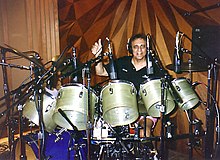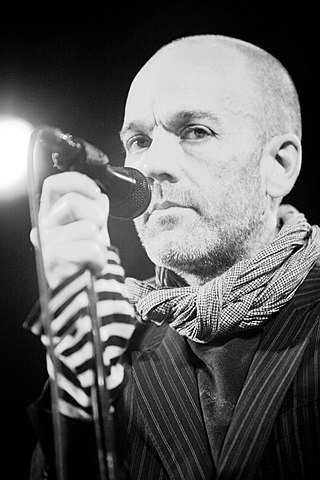
John Michael Stipe is an American singer, songwriter and artist, best known as the lead singer and lyricist of alternative rock band R.E.M.

Automatic for the People is the eighth studio album by American alternative rock band R.E.M., released by Warner Bros. Records on October 5, 1992, in the United Kingdom and Europe, and on the following day in the United States. R.E.M. began production on the album while their previous album, Out of Time (1991), was still ascending top albums charts and achieving global success. Aided by string arrangements from John Paul Jones and conducted by George Hanson, Automatic for the People features ruminations on mortality, loss, mourning, and nostalgia.

"Losing My Religion" is a song by American alternative rock band R.E.M., released in February 1991 by Warner Bros. as the first single and the second track from the group's seventh album, Out of Time (1991). Built on a mandolin riff, it was written by lead singer Michael Stipe and is about unrequited love. The song was an unlikely hit for the group, garnering extensive airplay on radio as well as on MTV and VH1 due to its critically acclaimed music video, directed by Tarsem Singh. The single became R.E.M.'s highest-charting hit in the United States, reaching No. 4 on the Billboard Hot 100 and expanding the group's popularity beyond its original fan-base. At the 1992 Grammy Awards, "Losing My Religion" won two awards: Best Short Form Music Video and Best Pop Performance by a Duo or Group with Vocal. In 2017, "Losing My Religion" was inducted into the Grammy Hall of Fame.

Monster is the ninth studio album by American rock band R.E.M., released on September 27, 1994, by Warner Bros. Records. It was produced by the band and Scott Litt and recorded at four studios. The album was an intentional shift from the style of their previous two albums, Out of Time (1991) and Automatic for the People (1992), by introducing loud, distorted guitar tones and simple lyrics.
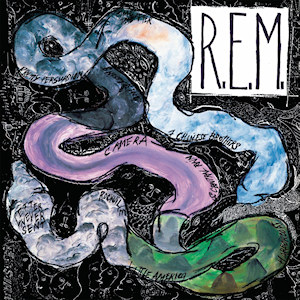
Reckoning is the second studio album by American alternative rock band R.E.M., released on April 9, 1984, by I.R.S. Records. Produced by Mitch Easter and Don Dixon, the album was recorded at Reflection Sound Studio in Charlotte, North Carolina, over 16 days in December 1983 and January 1984. Dixon and Easter intended to capture the sound of R.E.M.'s live performances, and used binaural recording on several tracks. Lead singer Michael Stipe dealt with darker subject matter in his lyrics, with water-related imagery being a recurring theme on the album.

In Time: The Best of R.E.M. 1988–2003 is the second official compilation album released by R.E.M. Issued in 2003, it includes tracks from their Warner Bros. Records era, from 1988's Green to 2001's Reveal, as well as two new recordings and two songs from movie soundtracks. The album was the tenth-best-selling album of 2003 in the UK, and the 50th-best-selling album of the 2000s in the UK.

Up is the eleventh studio album by American rock band R.E.M. It was released on October 26, 1998, through Warner Bros. Records. The album was the band's first without drummer and founding member Bill Berry, who retired from the band in October 1997. In his place, R.E.M. used session drummers such as Joey Waronker and Barrett Martin while also utilizing drum machines. The album was produced by Pat McCarthy, making it R.E.M.'s first album since Lifes Rich Pageant (1986) not to be produced by Scott Litt.
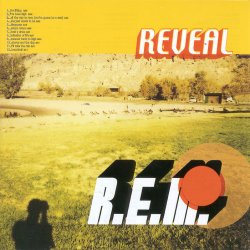
Reveal is the twelfth studio album by American rock band R.E.M. It was released on May 14, 2001, through Warner Bros. Records and was the second of three albums by the band to be produced with Pat McCarthy. It was also R.E.M.'s second album as a three-piece following the departure of drummer Bill Berry, and includes contributions from the band's touring members Joey Waronker, Scott McCaughey and Ken Stringfellow. The band recorded the album in various locations, including in Dublin, Miami, Vancouver, and their hometown of Athens, Georgia. The album saw R.E.M. continue to experiment with electronic music as they had on their previous album Up (1998), utilizing keyboards and drum machines, while also retaining elements of their earlier sound.

"Nightswimming" is a song by American alternative rock band R.E.M., released in July 1993 by Warner Bros. as the fifth single from the band's eighth album, Automatic for the People (1992). The song is a ballad featuring singer Michael Stipe accompanied only by bassist Mike Mills on piano, a string arrangement by former Led Zeppelin bassist John Paul Jones, and a prominent oboe by Deborah Workman in the latter part of the piece. Stipe sings about a group of friends who go skinny dipping at night, which draws from similar experiences in the band's early days. The music video for the song was directed by Jem Cohen.
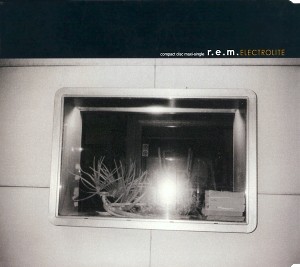
"Electrolite" is a song by American rock band R.E.M., released as their third single and closing track from their tenth studio album, New Adventures in Hi-Fi (1996). The song is a piano-based ballad to Los Angeles, Hollywood icons and the closing 20th century. Initially, Michael Stipe objected to including the song on the album, but was won over by Peter Buck and Mike Mills. It has since become one of his favorite R.E.M. songs as well as one of Radiohead lead singer Thom Yorke's; Radiohead has covered the song.

"Radio Free Europe" is the debut single by American alternative rock band R.E.M., released in 1981 on the short-lived independent record label Hib-Tone. The song features "what were to become the trademark unintelligible lyrics which [sic] have distinguished R.E.M.'s work ever since." The single received critical acclaim, and its success earned the band a record deal with I.R.S. Records. R.E.M. re-recorded the song for their 1983 debut album Murmur. The re-recording for I.R.S. became the group's first charting single, peaking at number 78 on the Billboard Hot 100 chart. The song is ranked number 389 in Rolling Stone's 500 Greatest Songs of All Time. In 2009, it was added to the Library of Congress's National Recording Registry for setting "the pattern for later indie rock releases by breaking through on college radio in the face of mainstream radio's general indifference."
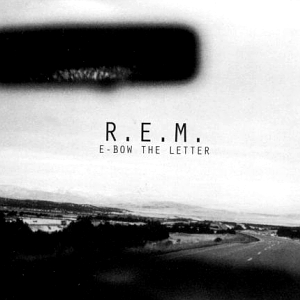
"E-Bow the Letter" is the first single from American rock band R.E.M.'s 10th studio album, New Adventures in Hi-Fi (1996). It was released on August 19, 1996, several weeks before the album's release. During the same month, R.E.M. signed a then record-breaking five-album contract with Warner Bros. Records. The song features American singer-songwriter and "Godmother of Punk" Patti Smith performing backing vocals. Smith was cited as a major influence by band members Michael Stipe and Peter Buck, and she also provided backing vocals for "Blue", the closing track on the band's final studio album, Collapse into Now, in 2011.

"Daysleeper" is a song by American alternative rock band R.E.M. It was released as the first single from their eleventh studio album Up on October 12, 1998. Sung from the point of view of a night shift worker corresponding with colleagues, "Daysleeper" focuses on the disorientation of time and circadian rhythm in such a lifestyle, leading to despair and loss of identity. Lead singer Michael Stipe developed the song's concept after noticing a sign reading "daysleeper" on a New York City apartment door.
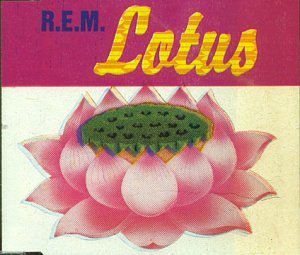
"Lotus" is a song by American rock band R.E.M., released as the second single from their eleventh studio album, Up (1998). The song is somewhat minimalist, with Michael Stipe singing surreal lyrics in a percussive manner. It builds on a four-note keyboard part, with a distorted guitar riff at the beginning and after the second chorus. The song's recurring line "I ate the lotus" appeared in an alternate form in a previous R.E.M. song, "Be Mine". The line "dot dot dot and I feel fine" is a reference to R.E.M.'s 1987 hit "It's the End of the World as We Know It ".

R.E.M. were an American alternative rock band from Athens, Georgia, formed in 1980 by drummer Bill Berry, guitarist Peter Buck, bassist Mike Mills, and lead vocalist Michael Stipe, who were students at the University of Georgia. One of the first alternative rock bands, R.E.M. was noted for Buck's ringing, arpeggiated guitar style; Stipe's distinctive vocal quality, unique stage presence, and obscure lyrics; Mills's melodic bass lines and backing vocals; and Berry's tight, economical drumming style. In the early 1990s, other alternative rock acts such as Nirvana, Pixies and Pavement viewed R.E.M. as a pioneer of the genre. After Berry left in 1997, the band continued with mixed critical and commercial success. The band broke up amicably in 2011, having sold more than 90 million albums worldwide and becoming one of the world's best-selling music acts.
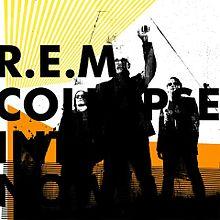
Collapse into Now is the fifteenth and final studio album by American alternative rock band R.E.M., released on March 7, 2011, on Warner Bros. Produced by Jacknife Lee, who previously worked with the band on Accelerate (2008), the album was preceded by the singles "It Happened Today", "Mine Smell Like Honey", "Überlin" and "Oh My Heart".

Part Lies, Part Heart, Part Truth, Part Garbage 1982–2011 is a 2011 greatest hits album from alternative rock band R.E.M. Intended as a coda on their career, this is the first compilation album that features both their early work on independent record label I.R.S. Records in addition to their 10 studio releases through Warner Bros. Records. The double-disc retrospective was released through Warner Bros. on November 11, 2011, and was compiled by the band members; the existence of the compilation was revealed simultaneously with the group's announcement that they were disbanding on September 21, 2011.

Complete Rarities: Warner Bros. 1988–2011 is a 2014 compilation album featuring live songs, singles' b-sides and non-album tracks recorded by alternative rock band R.E.M. during their tenure on Warner Bros. Records. All material has been previously released either physically or in digital-only formats.

REMTV is a six-disc DVD box set collecting appearances by American alternative rock band R.E.M. on MTV and related channels, from 1983 to 2008, released November 24, 2014. The collection was compiled by the former band members as they looked through all of the MTV film footage in their vault to prepare the release of Unplugged: The Complete 1991 and 2001 Sessions.

R.E.M. at the BBC is a 2018 live album box set by American alternative rock band R.E.M. released on October 19, 2018. The eight-disc compilation features sessions recorded between 1984 and 2008, including a bonus DVD of videos. Additionally, a two-disc best-of collection was released on the same day.

